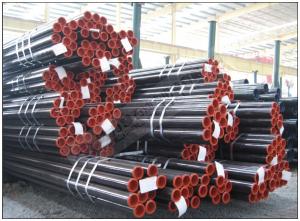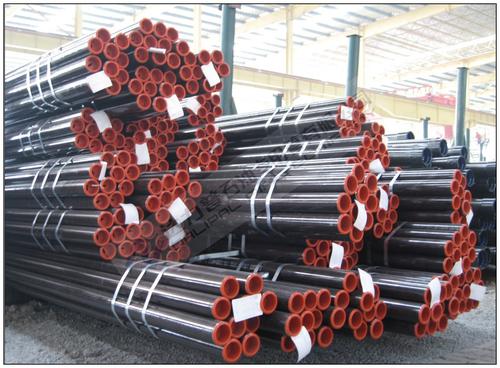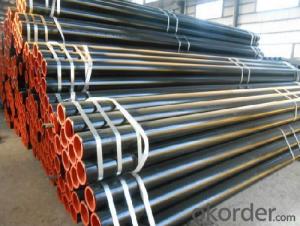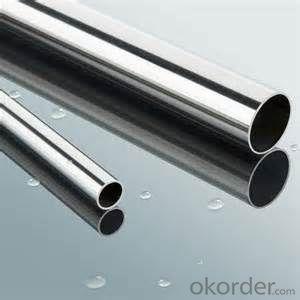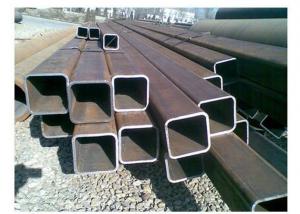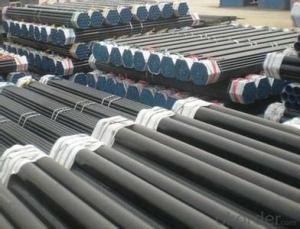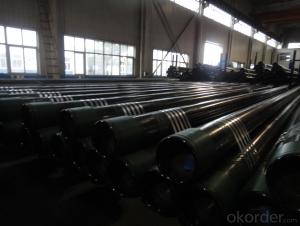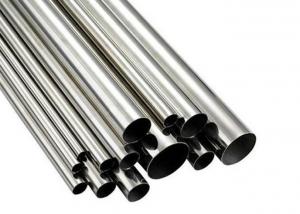Oil Country Tubular Goods
- Loading Port:
- Tianjin
- Payment Terms:
- TT OR LC
- Min Order Qty:
- -
- Supply Capability:
- 20000ton m.t./month
OKorder Service Pledge
Quality Product, Order Online Tracking, Timely Delivery
OKorder Financial Service
Credit Rating, Credit Services, Credit Purchasing
You Might Also Like
Oil Country Tubular Goods
eywords:API 5CT Steel Pipe, J55,K55,L80,N80Q,C90,T95,P110 Oil/Petroleum Casing Pipe, OCTG
1) Grade: J55,K55,L80,N80Q,C90,T95,P110
2) Size: 4 1/2", 5", 5 1/2", 6 5/8", 7", 7 5/8", 9 5/8", 10 3/4", 13 3/8", 16", 18 5/8", 20"
3) Wall thickness: 5.21 - 16.13 mm
4) Thread type: STC, LTC, BTC
5) Length: R1,R2,R3
6) All our casings accord with API 5CT standard, and we get the right to use the API 5CT LOGO.
| Size Destination | Weight Destination | Outside Diameter | Wall Thickness | Type of End Finish | ||||||
| Grade | ||||||||||
| kg/m | in | mm | in | mm | J55 K55 | L80 | N80 | C90 T95 | P110 | |
| 4 1/2 | 9.50 | 4.500 | 114.3 | 0.205 | 5.21 | PS | - | - | - | - |
| 10.50 | 0.224 | 5.69 | PSB | - | - | - | - | |||
| 11.60 | 0.250 | 6.35 | PSLB | PLB | PLB | PLB | PLB | |||
| 13.50 | 0.290 | 7.37 | - | PLB | PLB | PLB | PLB | |||
| 15.10 | 0.337 | 9.56 | - | - | - | - | PLB | |||
| 5 | 11.50 | 5.00 | 127.00 | 0.220 | 5.59 | PS | - | - | - | - |
| 13.00 | 0.253 | 6.43 | PSLB | - | - | - | - | |||
| 15.00 | 0.296 | 7.52 | PSLB | PLB | PLB | PLBE | PLB | |||
| 18.00 | 0.362 | 9.19 | - | PLB | PLB | PLBE | PLB | |||
| 21.40 | 0.437 | 11.10 | - | PLB | PLB | PLB | PLB | |||
| 23.20 | 0.478 | 12.14 | - | PLB | ||||||
| 24.10 | 0.500 | 12.70 | - | PLB | ||||||
| 5 1/2 | 14.00 | 5.500 | 139.7 | 0.244 | 6.20 | PS | - | - | - | - |
| 15.50 | 0.275 | 6.98 | PSLB | - | - | - | - | |||
| 17.00 | 0.304 | 7.72 | PSLB | PLB | PLB | PLBE | PLB | |||
| 20.00 | 0.361 | 9.17 | - | PLB | PLB | PLBE | PLB | |||
| 23.00 | 0.415 | 10.54 | - | PLB | PLB | PLBE | PLB | |||
| 6 5/8 | 20.00 | 6.625 | 168.28 | 0.288 | 7.32 | PSLB | - | - | - | - |
| 24.00 | 0.352 | 8.94 | PSLB | PLB | PLB | PLBE | PLB | |||
| 28.00 | 0.417 | 10.59 | - | PLB | PLB | PLBE | PLB | |||
| 32.00 | 0.475 | 12.06 | - | PLB | PLB | PLBE | PLB | |||
| 7 | 17.00 | 7.00 | 177.80 | 0.231 | 5.87 | - | - | - | - | - |
| 20.00 | 0.272 | 6.91 | PS | - | - | - | - | |||
| 23.00 | 0.317 | 8.05 | PSLB | PLB | PLB | PLBE | - | |||
| 26.00 | 0.362 | 9.19 | PSLB | PLB | PLB | PLBE | PLB | |||
| 29.00 | 0.408 | 10.36 | - | PLB | PLB | PLBE | PLB | |||
| 32.00 | 0.453 | 11.51 | - | PLB | PLB | PLBE | PLB | |||
| 35.00 | 0.498 | 12.65 | - | PLB | PLB | PLBE | PLB | |||
| 38.00 | 0.540 | 13.72 | - | PLB | PLB | PLBE | PLB | |||
| 7 5/8 | 24.00 | 7.625 | 193.68 | 0.300 | 7.62 | - | - | - | - | - |
| 26.40 | 0.328 | 8.33 | PSLB | PLB | PLB | PLBE | PLB | |||
| 29.70 | 0.375 | 9.52 | - | PLB | PLB | PLBE | PLB | |||
| 33.70 | 0.430 | 10.92 | - | PLB | PLB | PLBE | PLB | |||
| 39.00 | 0.500 | 12.70 | - | PLB | PLB | PLBE | PLB | |||
| 42.80 | 0.562 | 14.27 | - | PLB | PLB | PLB | PLB | |||
| 45.30 | 0.595 | 15.11 | - | PLB | PLB | PLB | PLB | |||
| 47.10 | 0.625 | 15.88 | - | PLB | PLB | PLB | PLB | |||
| 8 5/8 | 24.00 | 8.625 | 219.08 | 0.264 | 6.71 | PS | - | - | - | - |
| 28.00 | 0.304 | 7.72 | - | - | - | - | - | |||
| 32.00 | 0.352 | 8.94 | PSLB | - | - | - | - | |||
| 36.00 | 0.400 | 10.16 | PSLB | PLB | PLB | PLBE | PLB | |||
| 40.00 | 0.450 | 11.43 | - | PLB | PLB | PLBE | PLB | |||
| 44.00 | 0.500 | 12.70 | - | PLB | PLB | PLBE | PLB | |||
| 49.00 | 0.557 | 14.15 | - | PLB | PLB | PLBE | PLB | |||
| 9 5/8 | 32.30 | 9.625 | 244.48 | 0.312 | 7.92 | - | - | - | - | - |
| 36.00 | 0.352 | 8.94 | PSLB | - | - | - | - | |||
| 40.00 | 0.395 | 10.03 | PSLB | PLB | PLB | PLBE | - | |||
| 43.50 | 0.435 | 11.05 | - | PLB | PLB | PLBE | PLB | |||
| 47.00 | 0.472 | 11.99 | - | PLB | PLB | PLBE | PLB | |||
| 53.50 | 0.545 | 13.84 | - | PLB | PLB | PLBE | PLB | |||
| 58.40 | 0.595 | 15.11 | - | PLB | PLB | PLB | PLB | |||
| 10 3/4 | 32.75 | 10.75 | 273.05 | 0.279 | 7.09 | - | - | - | - | - |
| 40.50 | 0.350 | 8.89 | PSB | - | - | - | - | |||
| 15.50 | 0.400 | 10.16 | PSB | - | - | - | - | |||
| 51.00 | 0.450 | 11.43 | PSB | PSB | PSB | PSBE | PSB | |||
| 55.50 | 0.495 | 12.57 | - | PSB | PSB | PSBE | PSB | |||
| 60.70 | 0.545 | 13.84 | - | - | - | PSBE | PSB | |||
| 65.70 | 0.595 | 15.11 | - | - | - | PSB | PSB | |||
| 13 3/8 | 48.00 | 13.375 | 339.73 | 0.330 | 8.38 | - | - | - | - | - |
| 54.50 | 0.380 | 9.65 | PSB | - | - | - | - | |||
| 61.00 | 0.430 | 10.92 | PSB | - | - | - | - | |||
| 68.00 | 0.480 | 12.19 | PSB | PSB | PSB | PSB | PSB | |||
| 72.00 | 0.514 | 13.06 | - | PSB | PSB | PSB | PSB | |||
| 16 | 65.00 | 16 | 406.40 | 0.375 | 9.53 | - | - | - | - | - |
| 75.00 | 0.438 | 11.13 | PSB | - | - | - | - | |||
| 84.00 | 0.495 | 12.57 | PSB | - | - | - | - | |||
| 109.00 | 0.656 | 16.66 | P | P | P | - | P | |||
| 18 5/8 | 87.50 | 18.625 | 473.08 | 0.435 | 11.05 | PSB | - | - | - | - |
| 20 | 94.00 | 20 | 508.00 | 0.438 | 11.13 | PSLB | - | - | - | - |
| 106.50 | 0.500 | 12.70 | PSLB | - | - | - | - | |||
| 133.00 | 0.635 | 16.13 | PSLB | - | - | - | - | |||
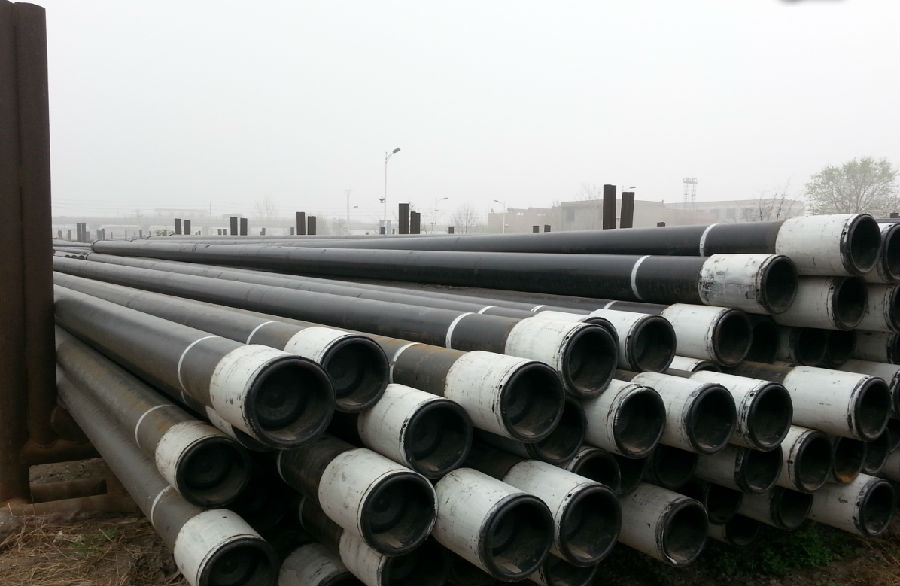
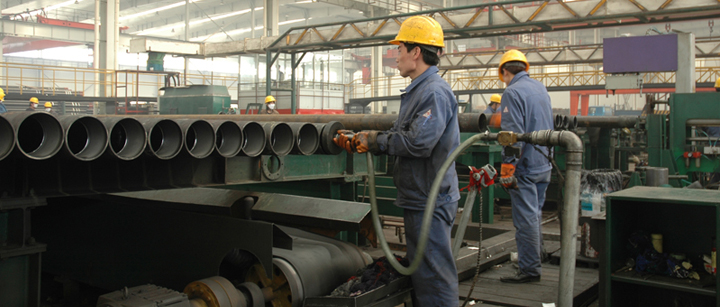
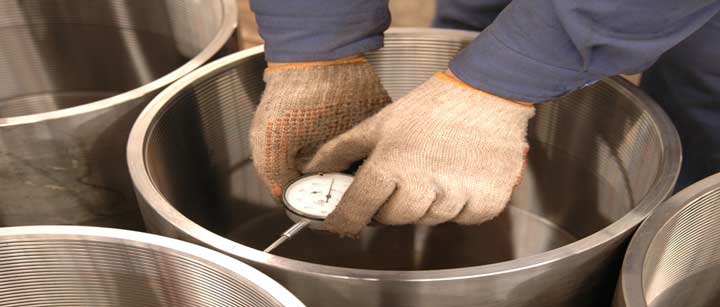
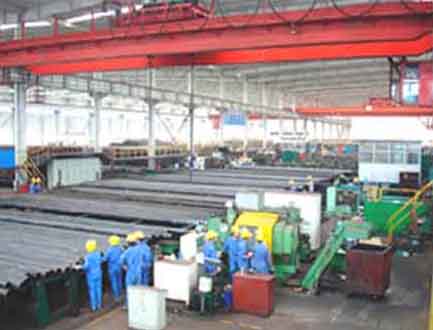
- Q: Are steel pipes suitable for potable water supply?
- Yes, steel pipes are suitable for potable water supply. They are durable, resistant to corrosion, and can handle high water pressure, making them a reliable choice for transporting drinking water.
- Q: How do steel pipes handle chemical exposure?
- Steel pipes are renowned for their excellent ability to resist exposure to chemicals. The strength and durability of steel make it a dependable material for managing different types of chemicals. Steel pipes can endure contact with a diverse array of corrosive substances like acids, alkalis, solvents, and gases without undergoing significant degradation or damage. One of the primary factors contributing to the effectiveness of steel pipes in handling chemical exposure is their innate resistance to corrosion. Steel naturally resists corrosion and can create a protective oxide layer on its surface, which acts as a barrier against chemical attack. Additionally, steel pipes can be coated or lined with materials that have corrosion-resistant properties, such as epoxy, polyethylene, or cement, to offer additional defense against aggressive chemicals. Furthermore, steel pipes find widespread use in industrial settings where they encounter various chemicals. They are extensively employed in chemical plants, refineries, water treatment facilities, and other industries that require the transportation or storage of chemicals. Steel pipes can withstand the high pressures and temperatures associated with these processes while retaining their structural integrity and resistance to chemicals. However, it is important to acknowledge that the resistance of steel pipes to chemical exposure may vary depending on the specific type and concentration of the chemical. Certain highly corrosive substances may necessitate additional measures, such as specialized coatings or alloys, to ensure long-term protection. In conclusion, steel pipes are generally well-suited for managing chemical exposure due to their inherent resistance to corrosion, durability, and versatility. Their capability to endure a wide range of corrosive substances makes them a trustworthy choice for diverse industrial applications involving the transportation and storage of chemicals.
- Q: Can steel pipes be used for conveying sewage and wastewater?
- Yes, steel pipes can be used for conveying sewage and wastewater. Steel pipes are known for their strength, durability, and resistance to corrosion, making them suitable for transporting various types of fluids, including sewage and wastewater. Additionally, steel pipes can withstand high pressure and are capable of handling the abrasive and corrosive nature of sewage and wastewater, making them a reliable choice for such applications.
- Q: Can steel pipes be used for underground oil and gas pipelines?
- Yes, steel pipes are commonly used for underground oil and gas pipelines due to their durability, strength, and resistance to corrosion.
- Q: Can steel pipes be used for geothermal applications?
- Yes, steel pipes can be used for geothermal applications. Steel pipes have high strength and durability, which makes them suitable for handling the high temperatures and pressures involved in geothermal systems. Additionally, steel pipes are resistant to corrosion and can withstand the harsh conditions found deep underground, making them a reliable choice for transporting geothermal fluids.
- Q: How are steel pipes used in the construction of oil-fired power plants?
- Steel pipes are used in the construction of oil-fired power plants for various purposes such as transporting oil, steam, and hot gases, providing structural support, and ensuring efficient heat transfer. They are used for oil and fuel supply lines, steam and water circulation systems, exhaust gas systems, and other critical infrastructure where high pressure and high temperatures are involved. The durability, strength, and corrosion-resistant properties of steel pipes make them an ideal choice for such applications, ensuring the safe and reliable operation of oil-fired power plants.
- Q: How do steel pipes perform in earthquake-prone regions?
- Steel pipes perform well in earthquake-prone regions due to their high strength and ductility. They are capable of flexing and absorbing seismic energy, reducing the risk of catastrophic failure. Additionally, steel pipes can be designed with proper reinforcement to withstand ground movements, making them a reliable choice for infrastructure in earthquake-prone areas.
- Q: Can steel pipes be used for transporting chemicals?
- Yes, steel pipes can be used for transporting chemicals. Steel pipes are known for their high strength and durability, making them suitable for handling various chemicals, including corrosive substances. Additionally, steel pipes can withstand high pressure and temperature conditions, ensuring the safe transportation of chemicals. However, it is essential to select the appropriate grade of steel and implement proper coating or lining to prevent chemical reactions or corrosion that may compromise the integrity of the pipes.
- Q: Fastener type steel pipe scaffold steel pipe wall thickness
- According to the "construction of fastener type steel pipe scaffold safety technical specifications JGJ130-2011" stipulates that the specification of steel pipe should be Phi 48.3 * 3.6, that is, wall thickness is 3.6mm. The standards in Shanghai are in line with national standards and 3.25mm can be used.Shelf tubes commonly used specifications, sizes are generally 48.3x3.0, 48.3x3.25, 48.3x3.5.
- Q: How are steel pipes used in the construction of power plants?
- Steel pipes are used in the construction of power plants to transport various fluids, such as water, steam, and fuel, throughout the facility. They are essential for ensuring a reliable and efficient flow of these substances, which are crucial for the operation of power generation equipment. Additionally, steel pipes are also used for structural support and to create ventilation and exhaust systems within the power plant.
Send your message to us
Oil Country Tubular Goods
- Loading Port:
- Tianjin
- Payment Terms:
- TT OR LC
- Min Order Qty:
- -
- Supply Capability:
- 20000ton m.t./month
OKorder Service Pledge
Quality Product, Order Online Tracking, Timely Delivery
OKorder Financial Service
Credit Rating, Credit Services, Credit Purchasing
Similar products
Hot products
Hot Searches
Related keywords
